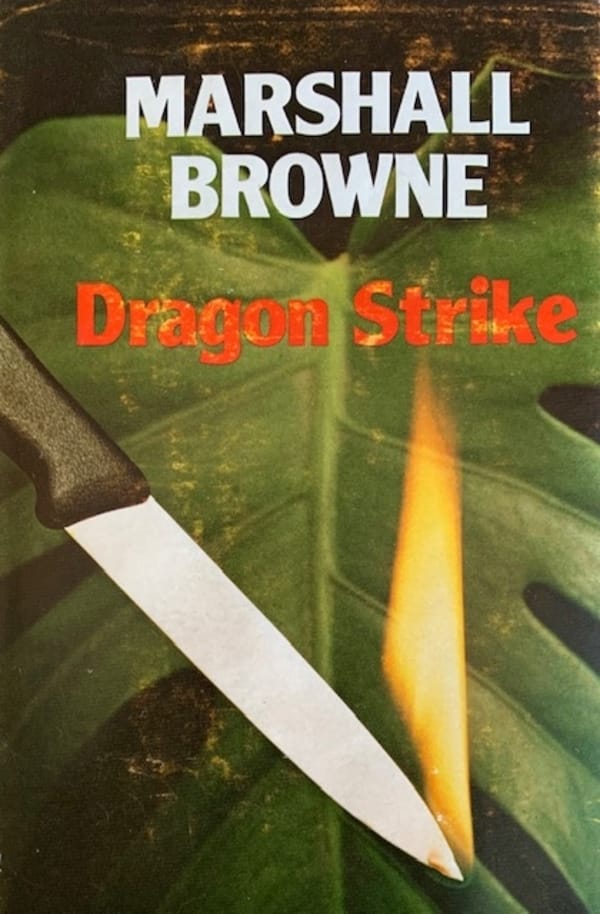THROWBACK THURSDAY: DRAGON STRIKE By Marshall Browne (1981)

Marshall Browne won the Australian Ned Kelly Award For Best First Crime Novel for The Wooden Leg Of Inspector Anders in 2000. It was a well deserved award for a good book, but unfortunately it was actually not Browne’s first crime novel.
When I interviewed the very charming Marshall Browne in December 2001 he said that he been surprised to win the Best First Crime Novel award, as he had previously written three crime novels in the early 1980s. These were stand-alone novels and were set in Asia, where Browne was working as a banker at the time. The books, however, were only ever published in Britain and probably never made their way to Australia. After writing them, Browne got caught up the demands of his job and did not return to writing until the late 1990s.
I have always meant to track down these three earlier crime novels by Browne, but it was only recently that I got a copy of the second book, Dragon Strike, thanks to renowned thriller collector and reviewer Steele Curry.
Dragon Strike is clever and highly original spy novel set in Hong Kong, China and North Korea. It features a British agent known only as Croft who is sent to Hong Kong to interview an intelligence source with knowledge of some pending operation in North Korea. When the source is killed, Croft continues with the mission and finds himself en-route to North Korea with a mysterious female Chinese spy. Meanwhile a Chinese People’s Liberation Army (P.L.A.) convoy makes its way steadily through an isolated part of China and a P.L.A. Intelligence Officer desperately tries to make sense of the various strands of a thirty year old plot.
The plotting is quite complex with various elements and characters, but Browne pulls it together well and the final details of the operation are quite surprising. I have read many spy novels over the years, but the idea at the core of Dragon Strike is probably one of the more original ones that I have come across and covers territory largely ignored by spy writers.
Dragon Strike is an intriguing novel and contains many of the elements that were to feature in Browne’s later books: the vivid, almost poetic descriptions of the countryside, the keen focus on small details and the occasional dreamlike feel to the story telling. The details of life in Korea and China are well described and evocative, and Browne makes good use of his varied experiences to give the novel a strong sense of authenticity.
Browne is a fine plotter and the book builds to a clever and surprisingly bleak ending. On the negative side, the pacing is occasionally sluggish and Croft is frustratingly ineffectual as an agent. He is more of an observer, than an active participant in the events that unfold, which dampens the suspense at times. The story is highly original, but on reflection not very likely and the reason for Croft’s involvement strains credibility. Nevertheless, it is an interesting and enjoyable variation on the standard spy thriller of the early 1980s and is well worth tracking down.
When Browne returned to writing in the late 1990s, he produced three very good novels in his series about the Italian police detective, Inspector Anders and an interesting stand alone novel, Rendezvous at Kamakura Inn. For me, the highlight of his writing were the two books he did about a German banker, Franz Schmidt, who becomes caught up in the harsh reality of Nazism in the late 1930s. Schmidt is a beautifully crafted character and the two novels, The Eye Of The Abyss and The Iron Heart, bristle with suspense and a sense of foreboding.
Marshall Browne died in 2014, with too fewer books to his credit.
Many thanks to Steele Curry for the copy of Dragon Strike.

